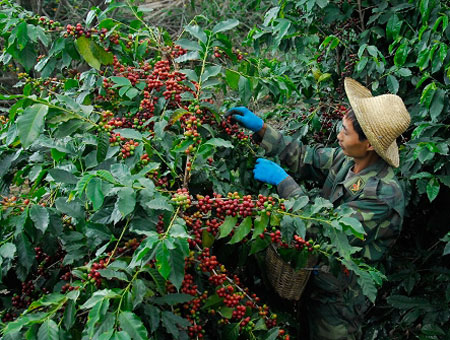Uganda's best coffee boutique coffee black coffee
Boutique coffee is fresh coffee. Whether it's food or drink, of course, the fresh the better, and so is boutique coffee. High-quality coffee should keep the coffee beans fresh before making, including the preservation of baked beans, and grind the coffee beans into powder before making, which is also to retain its original and best flavor. The way of making hand-brewed coffee is such a way to make high-quality coffee, and it is also one of the coffee-making methods that can best retain the original flavor of coffee.
Uganda's best coffee is mainly produced in the mountains of Elgon and Bugisu along the Kenyan border in the north and Ruwensori in the west, and is available for export in January or February of each year.
The equator runs across Uganda, and the suitable climate makes it the main producing area of Robart coffee beans in the world. In the 1960s, Ugandan coffee production remained at 3.5 million bags a year. By the mid-1980s, coffee production had dropped to 250 bags a year, mainly for political reasons. But now coffee production is on the rise again, currently about 3 million bags a year. One of the main problems facing the coffee industry is that there are no good roads to transport coffee to ports such as Mombasa in Kenya or Dar es Salaam in Tanzania.
In order to improve the quality and reduce the cost of coffee, Uganda cancelled the exclusive management right of the Coffee Management Committee (Coffee Marketing Board, referred to as CMB) in November 1990. Most of the work originally undertaken by the Coffee Management Committee has now been handed over to the cooperative organization. Privatized coffee accounts for 2% of the country's export revenue, so the government imposes a tax on coffee shops, hoping to increase much-needed revenue. But instead, coffee exports fell by 20%, and coffee smuggling became more and more serious.
Like Tanzania, the rise in coffee prices in recent years has encouraged farmers to return to their estates and reclaim once-abandoned land to grow coffee, and the Ugandan coffee industry looks promising.

Important Notice :
前街咖啡 FrontStreet Coffee has moved to new addredd:
FrontStreet Coffee Address: 315,Donghua East Road,GuangZhou
Tel:020 38364473
- Prev

What are the features of coffee machines in well-known coffee estates?
Honduras Generally speaking, Honduran coffee has a good reputation and is suitable for blended coffee. Coffee in Honduras was imported from El Salvador. Honduras produces high-acid, high-quality coffee. As elsewhere, coffee grades in Honduras depend on altitude: coffee grown at 700 to 1,000 meters above sea level is medium, and coffee grown at 1,000 to 150 meters above sea level is medium.
- Next

Zaire coffee grows Arabica coffee in the northeast of the country
Boutique coffee is fresh coffee. Whether it's food or drink, of course, the fresh the better, and so is boutique coffee. High-quality coffee should keep the coffee beans fresh before making, including the preservation of baked beans, and grind the coffee beans into powder before making, which is also to retain its original and best flavor. And the way of making hand-made coffee is such a way to make high-quality coffee.
Related
- Does Rose Summer choose Blue, Green or Red? Detailed explanation of Rose Summer Coffee plots and Classification in Panamanian Jade Manor
- What is the difference between the origin, producing area, processing plant, cooperative and manor of coffee beans?
- How fine does the espresso powder fit? how to grind the espresso?
- Sca coffee roasting degree color card coffee roasting degree 8 roasting color values what do you mean?
- The practice of lattes: how to make lattes at home
- Introduction to Indonesian Fine Coffee beans-- Java Coffee producing area of Indonesian Arabica Coffee
- How much will the flavor of light and medium roasted rose summer be expressed? What baking level is rose summer suitable for?
- Introduction to the characteristics of washing, sun-drying or wet-planing coffee commonly used in Mantenin, Indonesia
- Price characteristics of Arabica Coffee Bean Starbucks introduction to Manning Coffee Bean Taste producing area Variety Manor
- What is the authentic Yega flavor? What are the flavor characteristics of the really excellent Yejasuffi coffee beans?

